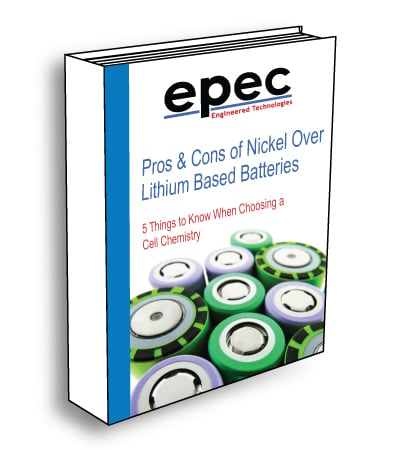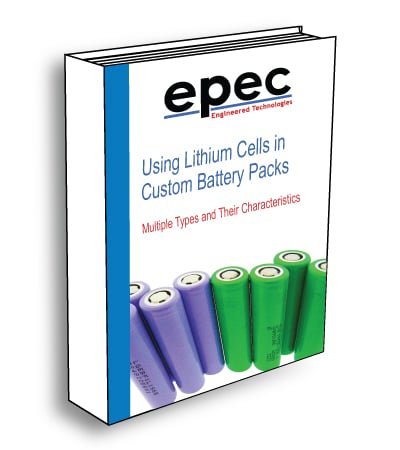
Lithium vs NiMH Battery Packs
Lithium and nickel metal hydride (NiMH) battery packs each offer distinct advantages depending on application needs. Lithium chemistries deliver high energy density and compact size but require complex safety systems and come at a higher cost. NiMH packs, while larger, are more cost-effective, safer to design and manufacture, and suitable for many custom applications.
At a Glance: NiMH vs Lithium Battery Packs
- NiMH battery packs are ideal for cost-sensitive applications with moderate energy demands.
- Lithium battery packs offer superior energy density and compact form factor but require advanced battery management systems (BMS) and carry higher safety risks.
- NiMH battery packs can be enhanced with optional BMS for improved performance and device communication.
Specifications Comparison
| Parameter | NiMH | Lithium | Units |
|---|---|---|---|
| Cell Voltage | 1.2 | 3.6 | V |
| Specific Energy | 1-80 | 3-100 | Wh/kg |
| Specific Power | <200 | 100-1000 | W/kg |
| Energy Density | 70-100 | 80-200 | kWh/m3 |
| Power Density | 1.5-4 | 0.4-2 | MW/m3 |
| Efficiency | 81 | 99 | % |
| Average Cell Capacity | 2200 | 1500 | mAh |
Cost and Size Considerations
NiMH battery packs are significantly more affordable than lithium alternatives. Final production costs for NiMH are typically less than 50% of lithium packs, and development costs are under 75%. While lithium cells are smaller and lighter, NiMH cells offer higher average capacity (2200 mAh vs. 1500 mAh), making them suitable for applications where space is less constrained.
Safety and Enclosure Design
NiMH batteries pose fewer safety risks than lithium chemistries. They emit hydrogen and oxygen gases under extreme conditions, so enclosures should be vented and not airtight. Isolating the battery from heat sources and ensuring airflow helps reduce thermal stress and supports safe operation.
Battery Management Systems
While NiMH packs do not require a battery management system (BMS), they benefit from one. NiMH charging relies on current control rather than voltage thresholds, making accurate charging more difficult. Cost-effective BMS solutions can prevent overcharging, extend cycle life, and enable communication with host devices, similar to lithium systems.
Charging and Cycle Life
NiMH batteries self-discharge at approximately 1% per day and may experience memory effect. To mitigate this, Epec integrates BMS technologies from vendors like Texas Instruments and Analog Devices to enable trickle charging at rates below 0.025 C (C/40). Fast charging (<1 hour) can reduce cycle life; moderate-rate smart chargers (2–3 hours) are preferred.
Application Suitability
NiMH battery packs are well-suited for high-consumption applications and backup power systems. When paired with a BMS, they offer controlled charging/discharging and extended service life. Their reliability and environmental friendliness make them a strong choice for many custom designs.
Frequently Asked Questions
Quick Links
- What is the Difference in NiMH vs Lithium in Overall Cost and Battery Pack Size?
- Don’t NiMH Batteries Self-Discharge and Are Prone to the Memory Effect?
- Will NiMH Batteries Last as Long as a Lithium Battery?
- Does an Enclosure for NiMH Custom Battery Pack Need Venting Similar to Lithium Chemistry?
- Do I Really Need a BMS for Nickel Metal Hydride Battery Pack?
- What Are the Best Applications for Nickel Metal Hydride Battery Packs?
What is the Difference in NiMH vs Lithium in Overall Cost and Battery Pack Size?
NiMH packs cost less than 50% of lithium packs in production and under 75% in development. Lithium cells are smaller and lighter, but NiMH cells typically offer higher capacity (2200 mAh vs. 1500 mAh). This is where the two big differences are when it comes to these two chemistries:
- Cost: NiMH is less than 50% of a lithium battery in terms of the final battery pack production price, and it is less than 75% of a lithium battery in terms of the development of the product. While NiMH has some regulatory and other development steps, it is still significantly less than lithium.
- Size: Lithium cells are lighter and smaller than nickel metal hydride battery cells, however lithium battery cells only have an average of 1500mAh compared to the 2200 mAH average of NiMH cells.
Don’t NiMH Batteries Self-Discharge and Are Prone to the Memory Effect?
Yes, nickel metal hydride batteries will self-discharge 1% per day if used in a low-energy consummation or stand-by device and the chemistry has been known to succumb to the memory effect. However, using very cost effective BMS technology from manufacturers such as Texas Instruments, Analog Devices, and On Semiconductor, we can develop a system that trickle charges (charge rate of less than 0.025 C (C/40) ) the battery in order to ensure that the pack is always at its maximum capacity and reduce the negative effects of overcharging.
Will NiMH Batteries Last as Long as a Lithium Battery?
If a NiMH battery is repeatedly overcharged, small crystals form on the electrodes, inhibiting their ability to fully charge, and as a result, the battery’s voltage drops. Undercharging can cause low service where overcharging can cause loss of cycle life. The way to address this is using our cost effective BMS that manages the charging process so that there will 100% never be a chance that the battery can be overcharged and damaged.
Most low-end chargers use rudimentary timers rather than actively monitoring the voltage to determine when to cut off the charge current. Typically, a moderate rate (2- to 3-hour) smart charger is preferred for NiMH batteries. Extremely fast charging (less than 1 hour) can impact battery cycle life and should be limited to an as needed basis.
Does an Enclosure for NiMH Custom Battery Pack Need Venting Similar to Lithium Chemistry?
The primary gases emitted from the nickel-metal hydride battery when subjected to excessive overcharge or over-discharge is hydrogen and oxygen. Battery enclosure should not be airtight and should be strategically vented. Isolation of the battery from heat-generating components and ventilation around the battery will also reduce thermal stress on the battery and ease design of appropriate charging systems.
Do I Really Need a BMS for Nickel Metal Hydride Battery Pack?
No, you do not. However, NiMH battery packs are amongst the hardest batteries to charge accurately and because the BMS solutions are very cost effective we recommend having one in your design. The charging for NiMH batteries is based on forcing current through the battery whereas with lithium ion and lead acid batteries you can control overcharge by just setting a maximum charge voltage. Therefore, having an electronic safety in place will increase the overall life of the battery.
What Are the Best Applications for Nickel Metal Hydride Battery Packs?
Most applications where there is a high-energy consumption and demand, is where NiMH battery packs excel. They are also suitable in applications as backup power source, where the NiMH batteries have a BMS in order to control the charging and discharging to improve the lifetime of the battery pack.
What’s Best For Your Application?
Make the right choice for your battery needs. Discover the advantages of nickel metal hydride battery packs vs lithium packs. Explore the benefits of each battery chemistry in your application. Ensure longevity with cost-effective BMS solutions.
Request a Quote Request Design Support Request More Information









